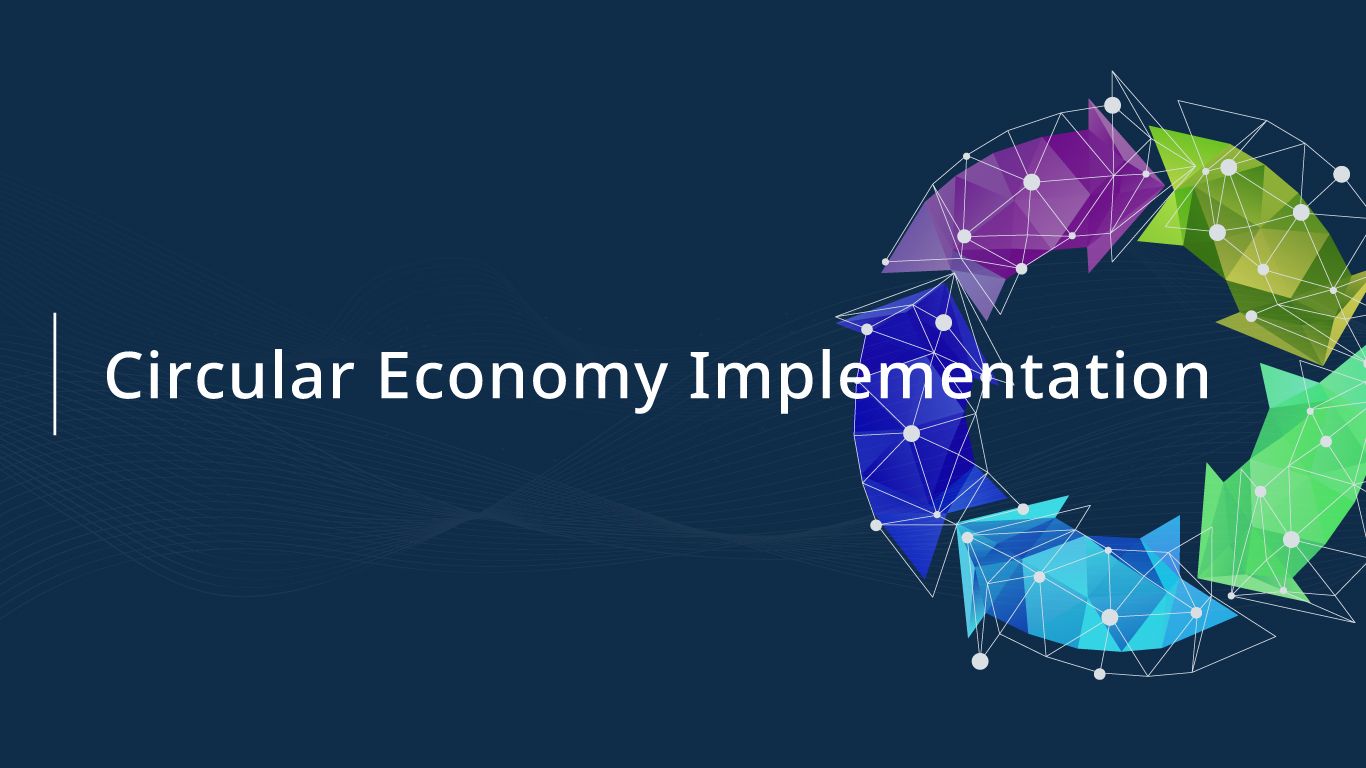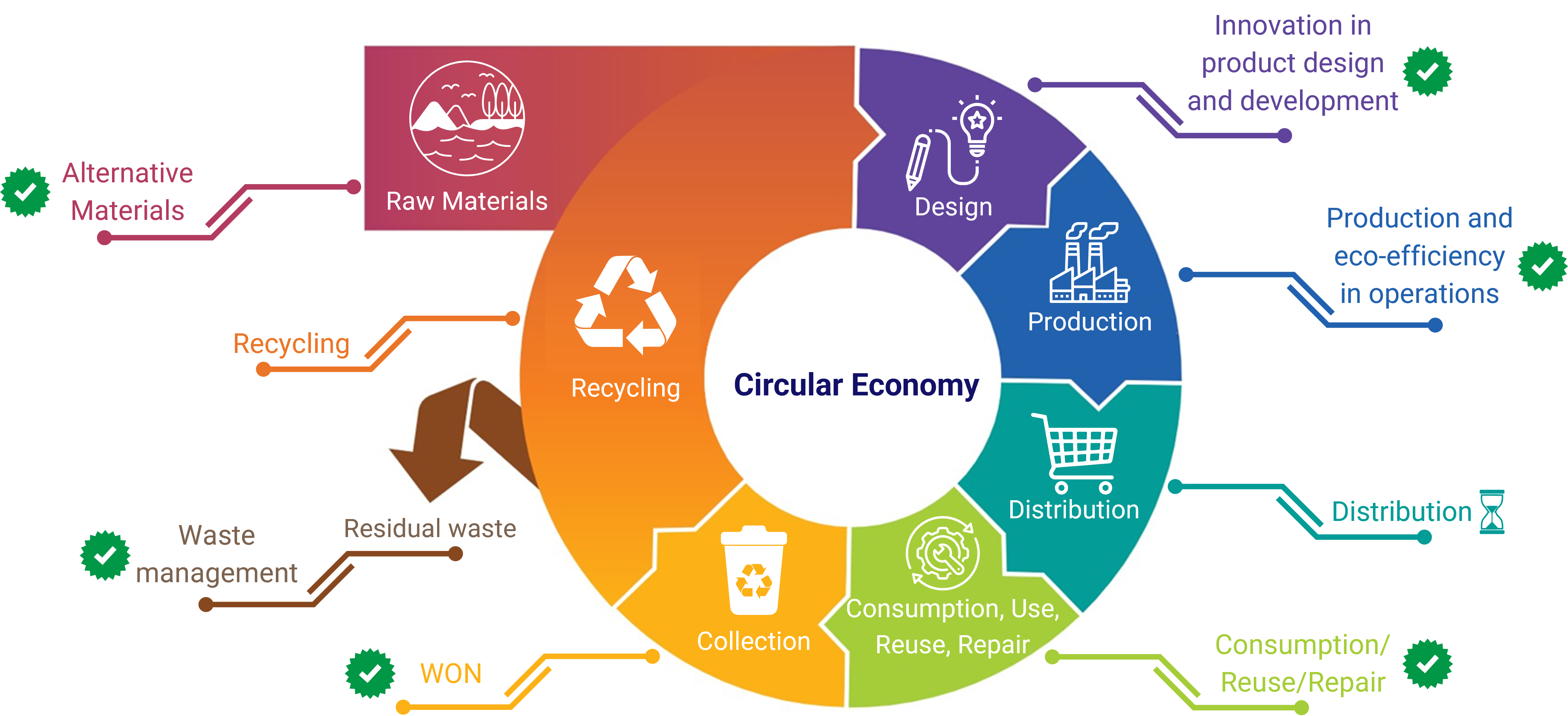
Circular Economy Policy and Operations
The company is committed to conducting sustainable business by applying circular economy concepts in business operations from developing business models, designing environmentally friendly products that promote material circulation, production processes, product distribution, usage, to post-use waste management. This is achieved through creating participation, confidence, and value for stakeholders in environmental, social, and economic dimensions to ensure sustainable business growth, responding to Thailand's BCG model strategy or Bio-Circular-Green Economy, and the United Nations Sustainable Development Goals (SDGs), promoting and supporting the company's circular economy operations to be efficient and concrete.
The company prioritizes efficient resource use according to circular economy concepts to promote sustainable production and consumption, reduce waste, and increase resource utilization value in all dimensions. The goal is to reduce environmental impact, conserve natural resources, and create a more flexible and sustainable economic system.
The company has promoted the integration of circular economy principles into all operational processes through awareness creation, changing production behaviors, and operations aligned with circular economy principles, while promoting participation of employees, business partners, and stakeholders.
Additionally, the company is certified in various standards related to circular economy and develops products including innovations from collaborative projects under this concept, such as the "Won" project, which exemplifies creating cooperation for recycling and efficiently reusing resources


Participation in Community Development or Sustainable Social Problem Solving through Business Processes
Environmental problems, especially plastic waste overflow in cities, are significant issues affecting society and communities in terms of quality of life and economic conditions. Moreover, plastic waste problems cause environmental pollution that directly harms living organisms and creates numerous subsequent pollution problems. Currently, many countries are interested in and cooperating to find solutions, including establishing waste management policies, measures to reduce and eliminate plastic bag use, and recycling campaigns to jointly eliminate or reduce plastic waste and shift toward using environmentally friendly materials.
As a packaging manufacturer, the company recognizes and prioritizes reducing environmental problems, which are currently considered major issues with widespread impact both nationally and internationally. The company is committed to developing environmentally friendly raw materials and products through continuous study and research, including Eco-design in collaboration with customers, business partners, and employees to sustainably reduce environmental impact from raw material selection, production, packaging, transportation, to post-use packaging management. This aims to reduce environmental, social, and community impact while enhancing competitive potential and market opportunities, responding to expectations, needs, and demands of stakeholders throughout the value chain through raw material and product development by applying circular economy concepts within the organization to achieve business sustainability.
Community & Social Initiatives Aligned with Our Business Strategy
At TPBI, our community investment efforts are aligned with our circular economy strategy and core business in packaging and materials. We prioritize community projects that contribute to waste reduction, recycling, and material reuse in areas around our operations.
Through the “Won” Project, we engage local communities, schools, and local authorities such as municipalities and subdistrict administrative organizations (SAOs) in recycling education and collection programs. The project serves as an outreach platform where TPBI shares knowledge about waste segregation and circular resource use, encouraging both nearby and external communities to participate by sending recyclable materials to the program. This initiative not only reduces environmental impact but also fosters community awareness and participation in the circular economy.
Community projects are selected based on their alignment with TPBI’s circular economy goals, community readiness, and potential to scale. These initiatives are managed by the Circular Economy Department, which has dedicated personnel responsible for implementing and coordinating related activities.
Performance and outcomes from these initiatives are monitored annually, and key results are reported to senior management and the Board of Directors to ensure accountability and strategic alignment with TPBI’s sustainability goals.
| Indicator | Value | Unit |
|---|---|---|
| Carbon dioxide emission reduction | 570 | Tons of carbon |
| Equivalent to planting trees | 64,000 | Trees |
| Facebook followers | 35,000 | People |
| Number of donation points | 400 | Locations |
| Donation per kilogram of plastic | 5 | Baht |



